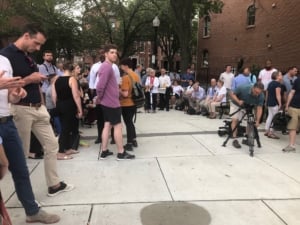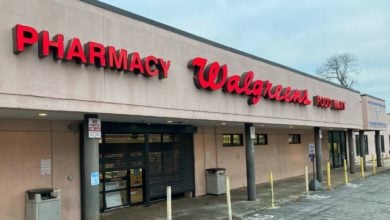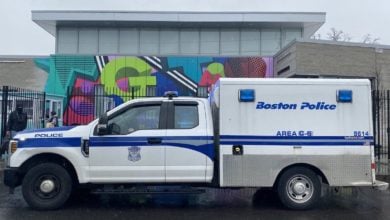At 5:15 pm on August 1, the Boston Police forcibly removed dozens of people experiencing homelessness from their long-term community hub on Atkinson Street in Boston. This brutality has been justified by, and is a police response to an incident that morning on Atkinson Street in which a corrections officer was attacked. (10 Boston)
Several community members who spoke to Liberation News believe the altercation was in response to the death of Shayne Stilphen, a person experiencing homelessness who died in police custody from an untreated overdose. According to police, Stilphen is the fourth person to die in BPD custody since 2012. However, as reported by the Boston Globe the police “could not give an exact number” since they are not required to publicly report such deaths. The ongoing violence the homeless community faces from the police and other state agents was the primary factor that fueled the confrontation between community members and the corrections officer on August 1.
That night, several squad cars and dozens of police officers ambushed the residents of Atkinson Street who call the area their home, arresting more than 20 individuals in one sweep, some of whom were never ID’d. The initial arrests have set off an ongoing wave of state sanctioned repression targeted at the homeless community that has been dubbed “Operation Clean Sweep.”
According to city officials, there have been 34 arrests in the area since August 7. In addition to the arrests, the police have terrorized the homeless community with surveillance and harassment. On the night of August 6, police stole wheelchairs from three people living on the streets and crushed them in a garbage truck compressor. These wheelchairs held medical supplies and other personal possessions needed to survive.
“Every day there are seven to 15 people overdosing. Now that we’re not all together more people are dying,” one person experiencing homelessness told Liberation News. Police erected barricades on Atkinson Street where people have historically convened. Without a place to congregate, many people in the homeless community have been forced to scatter throughout the city. In addition to the severe lack of attainable resources, the homeless community has lost one of its central community spaces and support networks.
City initiated meeting highlights Boston’s class divisions

On August 7, city officials including representatives from the Mayor’s office and BPD held a public meeting outside of the South End branch of the Boston Public Library. The heated meeting revealed a disturbing divide between the affluent residents of the South End and the homeless community that bears the brunt of capitalist oppression. Although many residents demonized and vilified the homeless community, several attendees spoke out in favor of city wide narcan trainings, safe injection facilities and more accessible services for people struggling with drug use.
“People who need the help don’t just need it for addiction,” said long-time South End resident Dottie Doyle. “They need job training, they need a roof over their head, they need medical care. They need everything a human needs to have a semblance of dignity. So it’s a whole systemic problem. We have apartments in our building that are over 4,000 dollars a month. We have investors that are investing in property in the Fenway area where these huge erections of glass and steel are being built and they’re empty, no one is living there and we have all these people living on the street. A fantasy: put all homeless people in these fancy condos until they’re ready to be occupied.”
Capitalism is the disease, socialism is the cure
Doyle’s remarks expose the harsh realities of life under capitalism. In an economic system designed to put profits over people, individuals do not have the right to a job or healthcare and must fend for themselves when capitalists decide to ship jobs overseas or impose mass layoffs. The combination of astronomical rents, a capitalist manufactured opioid epidemic and a severe lack of health and human services have deprived people of their humanity and dignity.
“Operation Clean Sweep” makes it crystal clear that we need to fight back against the gestapo-like tactics of the police on a collective basis. The city officialdom are not on our side. Organizations like the Boston Users Union, Massachusetts Union of the Homeless and the Party for Socialism and Liberation are organizing to build an effective struggle against the city’s war on the homeless community, and fight for the resources we need to achieve dignity and respect!





